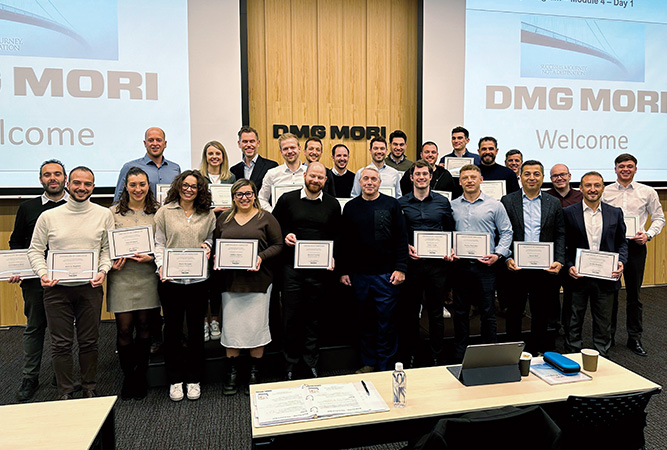- HOME
- SUSTAINABILITY
- Human Capital
- Work Environment
Work Environment
Only with motivated and innovative employees can we provide high-quality products and services to our customers and achieve sustainable growth as a company. With our mission statement of “play hard, study continuously, work together,” we commit ourselves to fostering a work environment that supports physical and mental health to allow everyone in any life stage to work with a sense of fulfillment, security, and vitality.
Increasing Employee Engagement
Creation of a Healthy Work Environment
DMG MORI encourages healthy and productive work styles. We strictly manage working hours, time at office, and the interval between workdays while encouraging all employees to make full use of 20 days of paid leave per year to allow everyone to lead an active and sustainable life. As part of our efforts, we give monthly awards to employees who practice our philosophy of “play hard, study continuously, work together” in each of the three categories.
Average total working hours per person*Aggregation based on internal standards
Japan
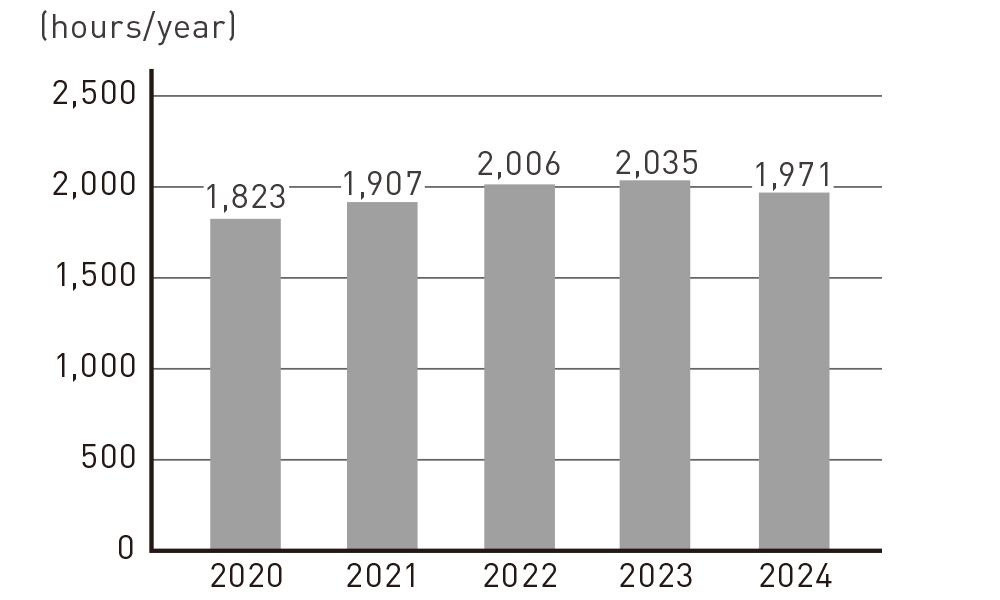 * Japan-based permanent or fixed-term employees who worked full-time throughout each year.
* Japan-based permanent or fixed-term employees who worked full-time throughout each year.
Germany
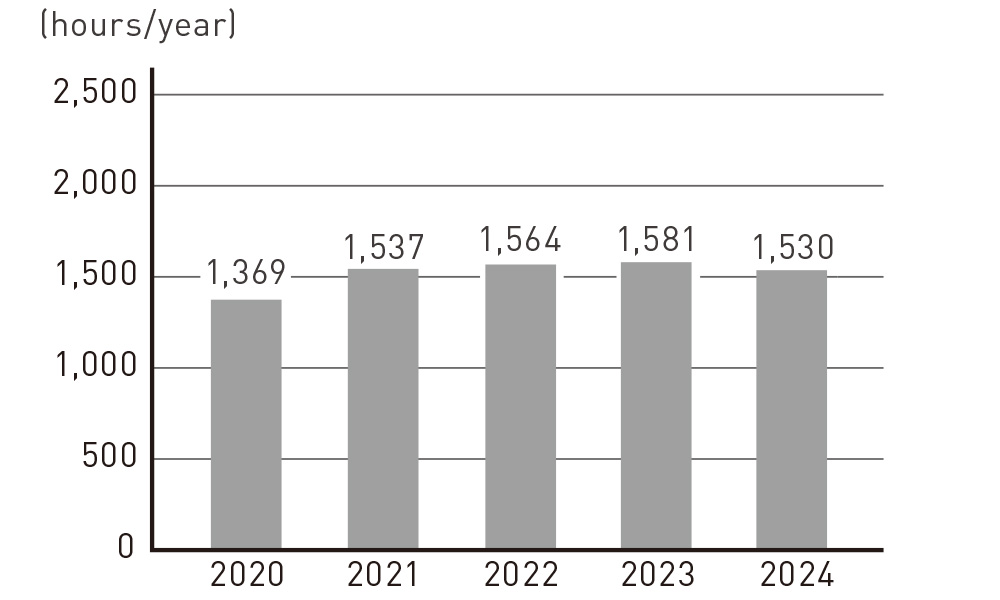 * Aggregation based on the contractual obligation (overtime not included)
* Working hours decreased in production departments in 2020 due to the lockdowns during the pandemic
* Aggregation based on the contractual obligation (overtime not included)
* Working hours decreased in production departments in 2020 due to the lockdowns during the pandemic
America
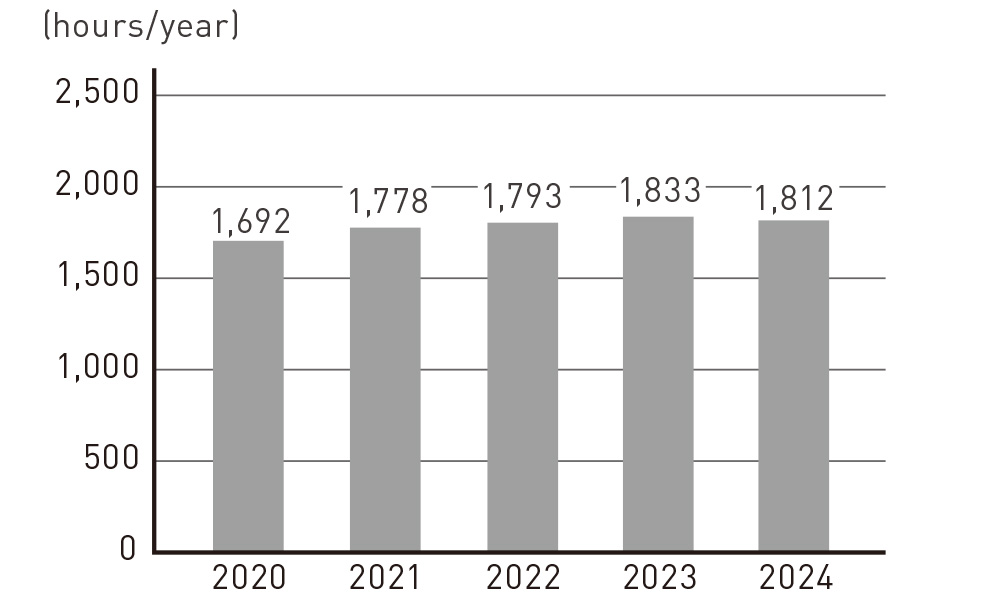
- Click here for data on the work environment in each country.
In addition, we believe that work uniforms and daily meals at our restaurants and cafes play an important role in ensuring a safe and motivated workplace. We have introduced uniforms that emphasize safety, functionality, and design, and transformed our restaurants’ menus and interiors to offer fun, delicious, and smart dining experiences. For this effort, a board of specialists awarded us 3 stars for Smart Meals (the highest rating for nutritionally balanced meals contributing to bodily health).
Nutritious Lunches at All Locations
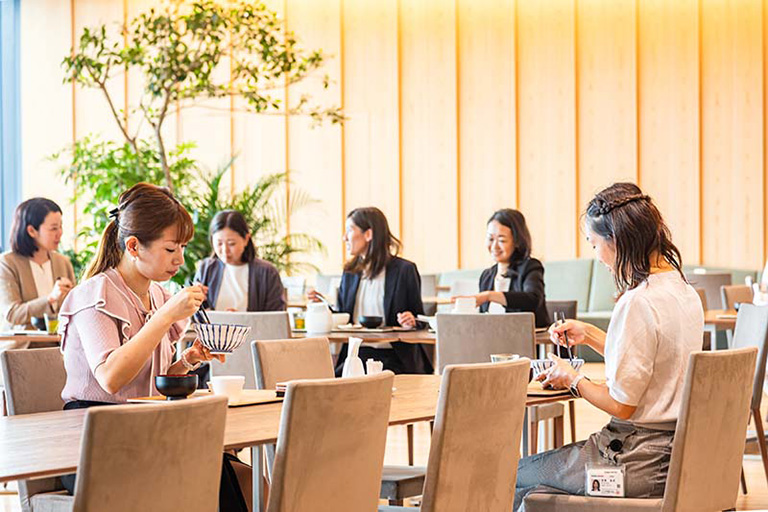 Nara Product Development Center
Nara Product Development Center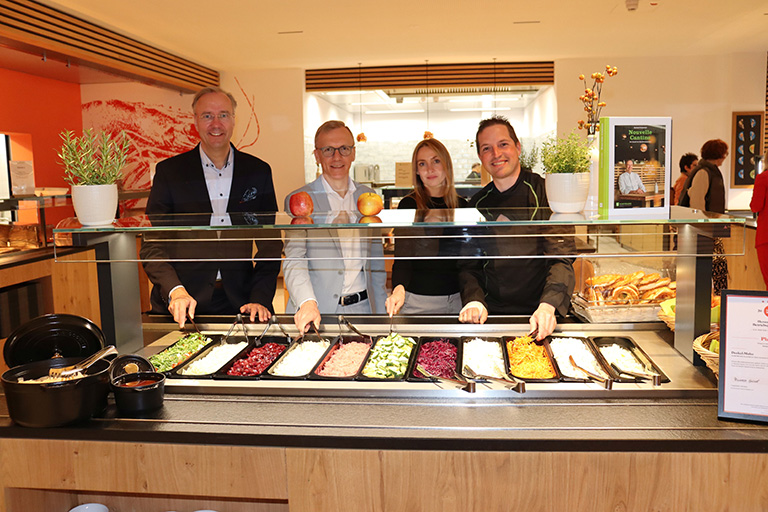 Pfronten(Germany)
Pfronten(Germany)Occupational Safety and Health
Under the Occupational Safety and Health Policy, we have implemented initiatives to reduce occupational health and safety risks and ensure a safe, comfortable work environment with a focus on fewer accidents and better physical and mental health. We have established safety and health committees on each of our campuses with monthly committee meetings, where the participants suggest and implement ideas for workplace improvement. To further reinforce our safety and risk assessment activities, which are essential to health and productivity management, we also launched a new internal organization called Safety and Health Center in January 2023.
With Safety Dojos on each of our campuses to teach basic work posture and danger call-out activities (Kiken Yochi Katsudo or KYK in Japanese), we commit ourselves to maintaining and improving employee safety awareness.
Also, we operate an hourly shuttle bus service for employees between Nara, Iga, and Nagoya, as well as a large buses for commuting between Nara and Iga. This eliminates risks during commuting and transfer, while allowing everyone to travel in comfort.
Examples of initiatives for occupational safety and health activities
- 1.Safety Subcommittee meetings are held within each manufacturing division, in which potential risks based on close calls are identified and analyzed, countermeasures and measures to reduce work risks are proposed, and workplace patrols are conducted to revise instructions.
- 2. If an injury (occupational accident) occurs, the campus manager, Safety and Health Group, and related members of the department to which the injured worker belongs meet to investigate the accident in order to verify the cause, and establish measures to prevent recurrence.
- 3.Information on any injuries, damage, loss, or traffic accidents that occur within the company is shared by the Safety and Health Committee, which also meets to discuss whether measures to prevent recurrence are effective and confirm whether there are any latent risks for similar accidents, in order to prevent recurrence.
- 4.Risk reduction activities conducted by Safety Subcommittees are reported within the Safety and Health Committee, and these activities are established throughout the organization if necessary. Expert committees also conduct workplace patrols.
*Risk reduction activity case study: Measures to prevent pallets from falling from workbenches
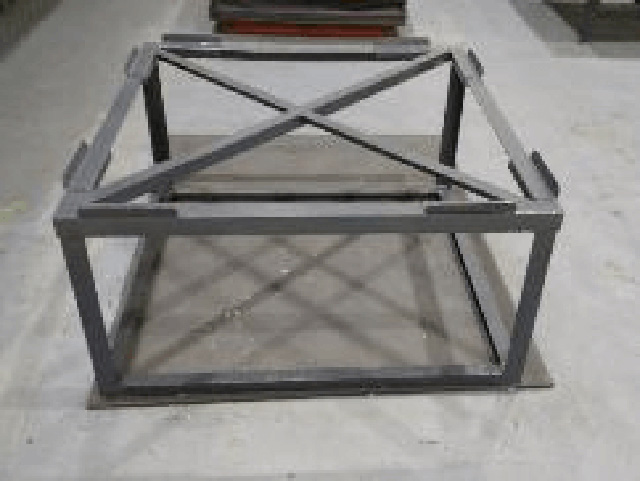
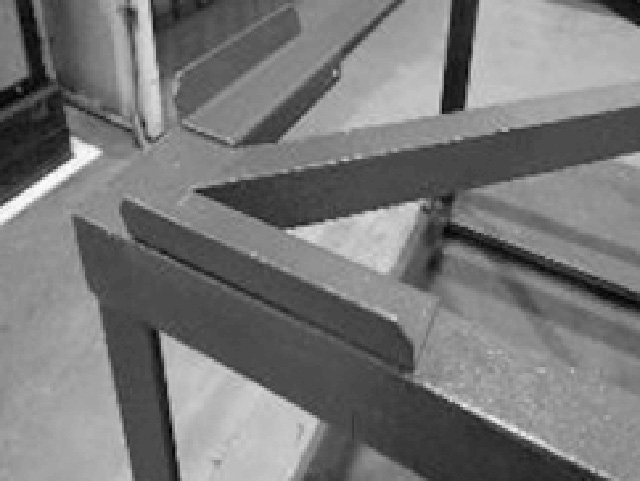
- 5.An occupational health physician provides health-related reports and warnings to help improve employee health awareness, and strives to establish mental health and workplace stress measures.
- 6. Safety Dojos are setup on our campuses in order to maintain and improve employee safety awareness. Participants study topics such as basic work posture and danger call-out activities (KYK), in order to establish safe and comfortable workplace environments.
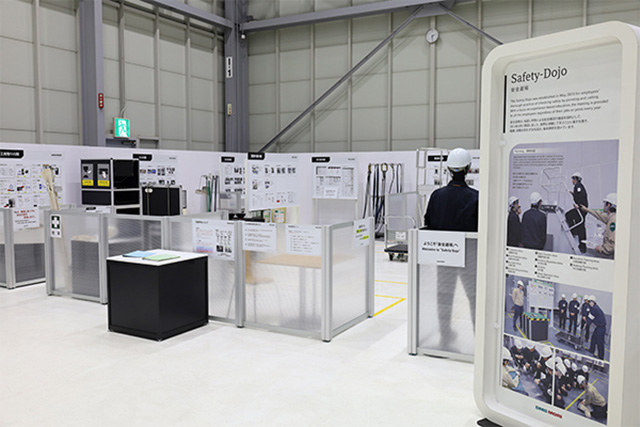 Safety Dojo
Safety Dojo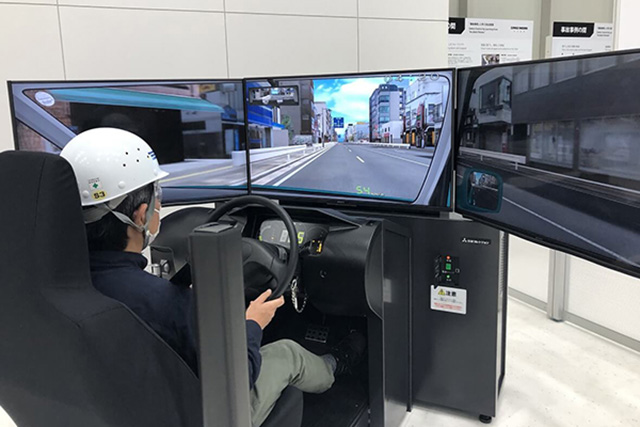 Driving simulator
Driving simulatorHealth and Productivity Management
We believe that the physical and mental well-being of our employees is essential for the stable operation and sustainable growth of our company. Over the past few years, we have rolled out several initiatives to support employee well-being. In 2019, we introduced comprehensive health checkups for all employees, including various cancer screenings, fully covered by the employer. In 2020, we turned all our premises completely smoke-free and established an in-house Health Care Promotion Center to drive health promotion initiatives.
As a result, we were selected for the second consecutive year for the "Health & Productivity Stock Selection" by the Ministry of Economy, Trade, and Industry (METI) and the Tokyo Stock Exchange in recognition of its excellent health management. In addition, for the third consecutive year, METI and Nippon Kenko Kaigi have recognized DMG MORI as a "White 500" company in the large corporation category of their "Certified Health & Productivity Management Outstanding Organizations Recognition Program 2025.” This program acknowledges corporations that demonstrate exceptional commitment to health management practices.
Work-life Balance
To balance work and family life, DMG MORI has adopted systems for maternity and childcare leave, nursing leave, and infertility treatment leave. In addition, our permanent company-led nursery school is available practically free of charge through a childcare subsidy allowance. We have also introduced a system of reduced working hours for childcare available until the child graduates from elementary school to support childcare-work balance. Furthermore, we actively encourage all our male employees to take childcare leave believing that the entire organization must change to realize a comfortable work environment for all genders.
In 2007, we received the "Kurumin" certification mark from the Ministry of Health, Labor, and Welfare in recognition of these initiatives. In addition to childcare, we have created an environment that facilitates the use of nursing care leave, menstrual leave, etc., aiming to realize a workplace where everyone can work sustainably.
We are continuing our efforts and have formulated the “Eighth Action Plan.”
Click here for the “Eighth Action Plan” from June 1, 2022 - May 31, 2025
(released on June 2, 2022).
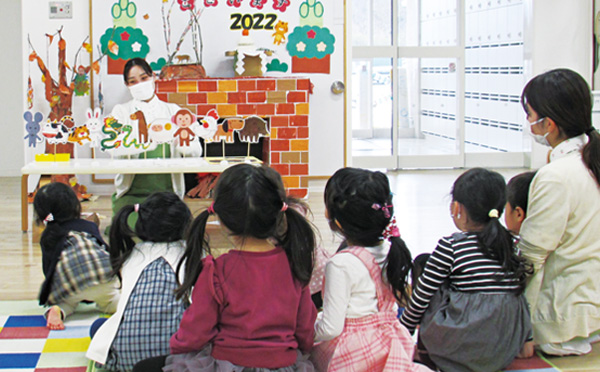 DMG MORI Child Care Center (Iga Campus)
DMG MORI Child Care Center (Iga Campus)Welfare & Community Development
To promote our employees’ health and motivation at work, we are offering a full range of in-house welfare systems for various club activities, long vacations, company housing, and dormitories for a comfortable lifestyle. Employees can utilize the gyms at each dormitory and office for refreshment and fitness. In addition, we established SHINDO YARDS as a complex of educational, cultural, and administrative facilities in front of Shindo Station along the JR Kansai Line in Iga City, Mie Prefecture. Close by, we opened DMG MORI Arena to promote and popularize local sports and to serve as a community exchange center. The building is also designated as a communal evacuation point, providing disaster protection for local residents.
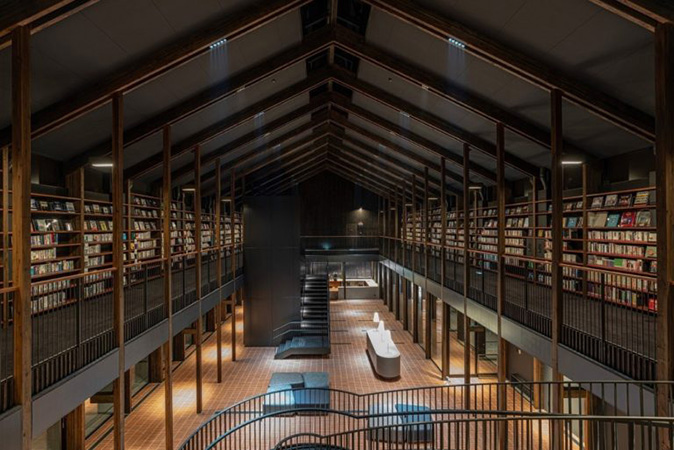 SHINDO YARDS
SHINDO YARDS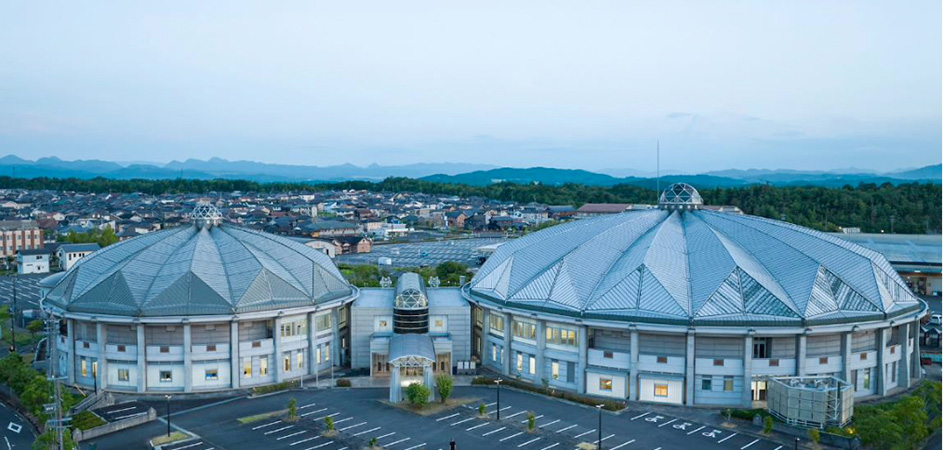 DMG MORI Arena
DMG MORI ArenaInternal training
All employees should be able to perform to the best of their abilities. Therefore, we offer training by job level and job category, training for managers to improve their leadership skills, TQM (total quality management) activities, and other opportunities for individual knowledge and skills acquisition. In addition, the Health Management and Promotion Center provides videos for e-learning and health-related education.
For reference:
FY2022 training hours (total): 59,892 hrs. (cost: 225 million yen)
FY2023 training hours (total): 62,335 hrs. (cost: 242 million yen)
We have established a one-year leadership program for selected employees from our offices around the world, with the aim of cultivating future leaders capable of working on a global scale. Since its inception in 2018, our leadership program has welcomed 161 participants from 18 countries. The comprehensive program includes around 100 hours of facilitated learning, complemented by hands-on-workshops held at our global locations four times a year. Through this program, participants not only enhance their technical leadership skills but also develop essential soft skills, including emotional intelligence, adaptability, and effective communication.
